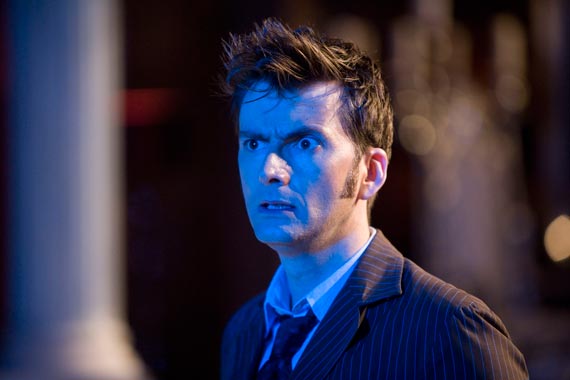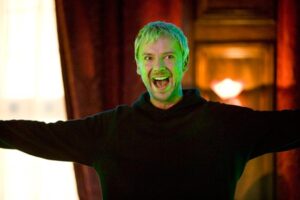The End of Time: Why it Needs More Love
Guest contributor Andrew Gledhill-Carr on Tennant’s divisive swan song.

I’ll start with the elephant in the room to get it out of the way. “I don’t want to go.” I really like this line and find it befitting for a character who suffers traumatic changes in personality, but I think it is important to understand that the Tenth Doctor lived a very short life. Six years, if his word is anything to go by, at the maximum. Now keep in mind that the Doctor’s personality changes as he regenerates, and once out of nine other times, this personality is just a tad narcissistic and only had six tiny earth years to live. Of course the Tenth Doctor didn’t want to go! It doesn’t matter that he never felt like that in the past, we’ve seen how drastic the Doctor can change with regeneration and on this occasion, he gained a persona that was not very keen on changing again.
I used to dislike the Master during The End of Time. I wasn’t very impressed with his insanity, and it still rings alarm bells when I watch it now, but I think Simm did an excellent job with what he was given, and made a very compelling performance for the episodes. While he might have lost his bloodchilling threat from The Sound of Drums, he became a rather complex character. I think perhaps his insanity is understandable given the circumstances of his resurrection, which was aborted mid-completion. But I think people miss the fact the Master regains his former stature as the story goes on, and by the end, he is back to the nefarious time lord we all know and love.
 What I really enjoyed about the Master during The End of Time was how unpredictable he became. Unlike many other adversaries in the show, the Master is not someone you can call a monster, and you can see that in his emotional moments with the Doctor. You can see that he really considers the Doctor’s offers of help, moments made even more poignant after having experienced the Master in classic episodes, because you consider everything they’ve done and been through. The classics in this sense are almost like their childhood, petty plans of domination and witty banter compared to where they are now.
What I really enjoyed about the Master during The End of Time was how unpredictable he became. Unlike many other adversaries in the show, the Master is not someone you can call a monster, and you can see that in his emotional moments with the Doctor. You can see that he really considers the Doctor’s offers of help, moments made even more poignant after having experienced the Master in classic episodes, because you consider everything they’ve done and been through. The classics in this sense are almost like their childhood, petty plans of domination and witty banter compared to where they are now.
But the star of The End of Time, for me is Wilfred Mott. How Bernard Cribbins did not win countless awards for his portrayal as Donna’s adorably realistic Grandfather I do not know. Every moment between Wilf and the Doctor is as well acted, well written and tear-jerkingly touching as the last. Russell tried something very new here, doing away with the pretty sidekick and putting in their place a person that contrasts and complements the Doctor befitting for Ten’s swansong. There will never be anything like the interaction between these two on the show again, because the circumstance and actors made it a very unique event. The café and the gun scene come to mind, and I think when people talk about The End of Time, these are the most prominent that come to identify the episode. They are also the scenes that I feel demonstrate why this is the best, and yes, I just said that, the best, regeneration story the history of Who has ever seen.
 With the café moment, the Time Lord is stripped away and you are left with a man afraid of dying. Some people, including Moffat I dare say, might disagree with this aspect, but it humanizes the Doctor and makes him very relatable. Yes he’s a Time Lord from Gallifrey who’s at least nine hundred and six years old, but he’s still a person. A living creature with an intelligent consciousness, with – and this is the key word – emotion! Other regeneration stories get so caught up with the action and the events, and when the time comes it’s as simple as handing over the keys to the TARDIS and all is well again, but this story is different, because it steps back, slows down and examines the scenario of a character knowing about their “death”, this time around, and how they deal with that.
With the café moment, the Time Lord is stripped away and you are left with a man afraid of dying. Some people, including Moffat I dare say, might disagree with this aspect, but it humanizes the Doctor and makes him very relatable. Yes he’s a Time Lord from Gallifrey who’s at least nine hundred and six years old, but he’s still a person. A living creature with an intelligent consciousness, with – and this is the key word – emotion! Other regeneration stories get so caught up with the action and the events, and when the time comes it’s as simple as handing over the keys to the TARDIS and all is well again, but this story is different, because it steps back, slows down and examines the scenario of a character knowing about their “death”, this time around, and how they deal with that.
Then you have the gun scene, where Wilf insists the Doctor takes his weapon to save his own life, and this for me is one of, if not the most powerful Tenth Doctor moments, because even in the face of death, even when the human race has been eradicated, the Doctor will not take the life of the Master. I think this moment manages to encourage admiration and disgust in him. “And that’s how the Master started,” – such an unarguable line that brings a very swift silence. In a way, he is being nobly selfish, and I think people should look here when they claim Ten is being ‘whiney’ in regards to his regeneration. This is proof that it is not the case. He is not having vanity issues at all, because here he would rather die than kill someone to save himself. But it is the moment after this scene that makes a powerful exchange between two characters a hundred-fold more powerful. Because as the Master tells the Doctor of the white point star (And thus the return of the Time Lords) he snatches that gun up without question. Immediately you know there is some big trouble ahead.
 I think Timothy Dalton deserves a quick mention for his portrayal of Rassilon in this story as well. He was born to play it. Rassilon IS Timothy Dalton. His commanding, looming presence, conveying such might and threat with just a look is beyond words to describe and he really sold the story here. I think without him, The End of Time wouldn’t be nearly as cinematic as it is (and it does run for a hundred and thirty five minutes, that’s movie length!)
I think Timothy Dalton deserves a quick mention for his portrayal of Rassilon in this story as well. He was born to play it. Rassilon IS Timothy Dalton. His commanding, looming presence, conveying such might and threat with just a look is beyond words to describe and he really sold the story here. I think without him, The End of Time wouldn’t be nearly as cinematic as it is (and it does run for a hundred and thirty five minutes, that’s movie length!)
This brings me to my next point. If none of these other reasons are enough to persuade you why The End of Time deserves to be loved then let me say two words. The soundtrack. The score for this story is godly. Every track feels right in its place, but more importantly, crafted with every ounce of love the people involved could muster. Whether it’s “The End Draws Near” during the café scene, leading you up to the cinematic pan of the earth and the hair-raising moment of Dalton’s reveal, or the variant of “All the Strange Strange Creatures” making what could otherwise be a silly moment when the Master becomes everyone on earth, a very compelling cliffhanger, or perhaps even the rendition of “This is Gallifrey” that’s become bitter, tired and war-like as the war-torn home planet of our hero is revealed, and then there is “Vale”, used sparingly in The Waters of Mars and masterfully as the Tenth Doctor says his final goodbye to the friends he’d known over his life. I could go on, but The End of Time is a musical masterpiece. The epitome of Murray’s work on the show.
Music is so integral to Doctor Who now, and after watching lots of the classic episodes I can see that more than ever (it is a key thing that is missing!) it doesn’t just enhance an emotion. It makes the emotion, and in an emotional episode Murray couldn’t get things more right.
 The final thing, that is rather hated among the Who community, that I feel makes this such a strong episode are the farewells waved by Ten to his friends. As mentioned above, “Vale” makes these moments incredibly strong, but the actual concept itself makes this episode, not just another story where the Doctor changes his face, but a goodbye. A goodbye to an era of marvellous stories and characters. Yes it does go on for a lengthy period of time, but not one moment feels out of place or wasted. I struggle to single out the best part, but I think it has to go to Sarah Jane’s scene. Elizabeth Sladen’s untimely death has made this moment ten times stronger. I don’t think I need to explain why.
The final thing, that is rather hated among the Who community, that I feel makes this such a strong episode are the farewells waved by Ten to his friends. As mentioned above, “Vale” makes these moments incredibly strong, but the actual concept itself makes this episode, not just another story where the Doctor changes his face, but a goodbye. A goodbye to an era of marvellous stories and characters. Yes it does go on for a lengthy period of time, but not one moment feels out of place or wasted. I struggle to single out the best part, but I think it has to go to Sarah Jane’s scene. Elizabeth Sladen’s untimely death has made this moment ten times stronger. I don’t think I need to explain why.
To finish, I’d like to mention something else that makes this story very interesting. The Day of the Doctor. I find it fascinating, and consoling to know that despite the events in this story, somewhere, somewhen, thirteen Time Lords are busy rescuing their homeworld. Perhaps we’ll see the mysterious woman who is alleged to be the Doctor’s mother again. Maybe Mr Dalton will return as the ever so terrifying Rassilon, and perhaps, just perhaps a certain John Simm is ready to regenerate (into Charles Dance I beg of you BBC!) and start a new plot of universal domination for Capaldi to thwart.
The End of Time is the definitive regeneration story of movie length and design that neatly bookmarks an era of the Doctor’s life like no other. It might not be perfectly flawless like Silence in the Library and Forest of the Dead, but I find it darned near hard to fault!








